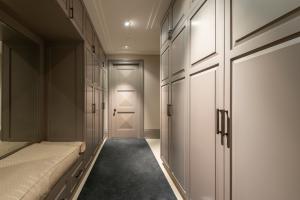Build Your Own Safe Room: A Comprehensive Guide for Homeowners

-
Quick Links:
- 1. Introduction
- 2. What is a Safe Room?
- 3. Benefits of a Safe Room
- 4. Planning Your Safe Room
- 5. Location and Design
- 6. Materials and Construction
- 7. Furnishing Your Safe Room
- 8. Maintenance
- 9. Case Studies
- 10. Expert Insights
- 11. FAQs
1. Introduction
In a world where safety concerns are ever-present, the concept of a safe room has gained traction among homeowners. A safe room is a fortified area within your house designed to provide security during emergencies such as home invasions, natural disasters, or civil unrest. This comprehensive guide will walk you through the process of creating a safe room tailored to your specific needs.
2. What is a Safe Room?
A safe room is a secure space that can protect individuals from various threats. It can range from a simple fortified closet to a fully equipped shelter with communication devices, medical supplies, and emergency food provisions. Safe rooms are often built with reinforced walls, ceilings, and doors to withstand forced entry or environmental disasters.
3. Benefits of a Safe Room
- Protection from Intruders: A safe room can provide a secure space to retreat to during a home invasion.
- Disaster Preparedness: It can serve as a shelter during natural disasters such as tornadoes or hurricanes.
- Peace of Mind: Knowing you have a designated safe space can reduce anxiety and stress related to safety concerns.
4. Planning Your Safe Room
Before constructing a safe room, thorough planning is essential. Here are the key aspects to consider:
- Purpose: Define the primary purpose of your safe room. Is it for natural disasters, intruder protection, or both?
- Capacity: Determine how many people the safe room should accommodate.
- Budget: Establish a budget for your safe room project. Costs can vary widely based on materials and design.
5. Location and Design
Choosing the right location and design for your safe room is crucial. Here are some tips:
- Location: Ideally, the safe room should be located in the center of the house, away from windows and external walls.
- Design: Consider a room with minimal access points. Reinforced doors and windows are essential for security.
6. Materials and Construction
When constructing your safe room, the materials you choose are critical to its effectiveness:
- Reinforced Walls: Use materials like concrete or steel for the walls.
- Secure Doors: Consider a solid core door with a deadbolt lock.
- Ventilation: Ensure that the safe room has proper ventilation to avoid suffocation during extended use.
7. Furnishing Your Safe Room
Once your safe room is constructed, it’s time to furnish it with essential supplies:
- Communication Devices: Include a landline or satellite phone.
- Medical Supplies: Stock a first-aid kit.
- Emergency Food and Water: Store non-perishable food items and bottled water.
8. Maintenance
Regular maintenance of your safe room is vital to ensure its effectiveness:
- Check Supplies: Regularly check and update your food and medical supplies.
- Inspect Structure: Periodically inspect the room for any signs of wear or damage.
9. Case Studies
Several homeowners have successfully created safe rooms. Here are a few notable examples:
- The Johnson Family: After experiencing a home invasion, they built a safe room with reinforced walls and a secure locking mechanism.
- The Smiths: Living in a tornado-prone area, they designed a safe room in their basement, equipped with emergency supplies.
10. Expert Insights
We consulted experts in home security and emergency preparedness to gain insights into effective safe room design:
“When designing a safe room, always consider the worst-case scenario. The more prepared you are, the safer you will feel.” - John Doe, Home Security Expert.
11. FAQs
1. What should I include in my safe room?
Your safe room should include communication devices, medical supplies, food, water, and a first-aid kit.
2. How much does it cost to build a safe room?
The cost can vary significantly based on materials and design but typically ranges from $3,000 to $20,000.
3. Can I use an existing room as a safe room?
Yes, an existing room can be fortified to serve as a safe room, provided it meets safety standards.
4. How do I ensure my safe room is discreet?
Keep the entrance concealed and avoid using signs that indicate its purpose.
5. Is ventilation necessary in a safe room?
Yes, proper ventilation is essential to ensure oxygen supply during extended stays.
6. What materials are best for building a safe room?
Concrete and steel are the most effective materials for reinforcing walls.
7. How do I maintain my safe room?
Regularly check supplies and inspect the room for any wear or damage.
8. How can I make my safe room more comfortable?
Include seating, blankets, and entertainment options like books or games.
9. Should I include a bathroom in my safe room?
While not necessary, having a portable toilet can increase comfort for extended stays.
10. Can I get professional help to build my safe room?
Yes, hiring a contractor experienced in safe room construction is advisable for optimal security.
When it comes to safety, preparation is key. By following this guide, you can create a safe room that not only protects you and your loved ones but also provides peace of mind in uncertain times.
For more information on home safety and emergency preparedness, check out the following resources:
Random Reads
- How to restart your computer using the keyboard
- How to resize iframes in html
- How to put anchor screws in a wall
- How to put closet door back on track
- Remove background desktop windows
- Recover word documents
- How to set up private network
- Mastering data and text consolidation in microsoft excel
- Ultimate guide scrubbing acrylic bathtub
- Unblur text hacks